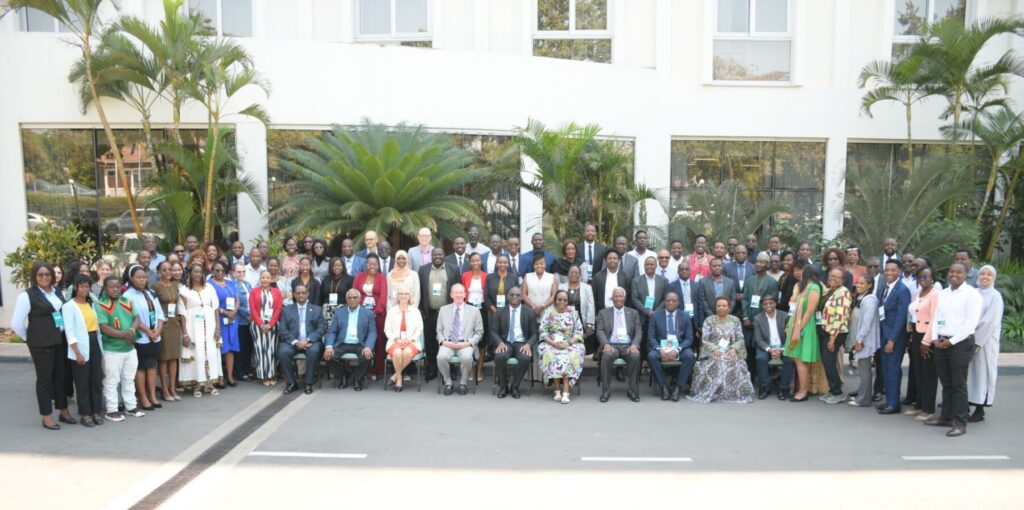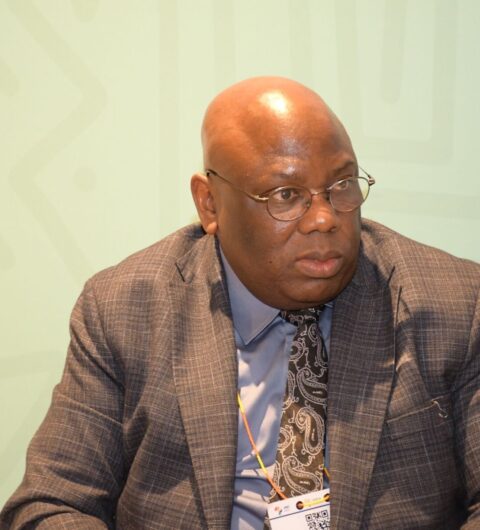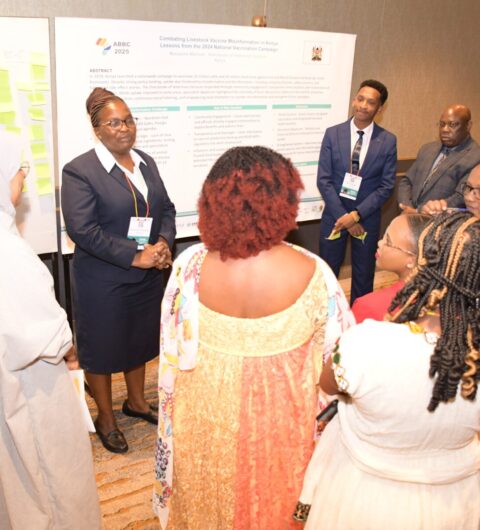
The Africa Biennial Biosciences Communication (ABBC) symposium is a multi-stakeholder, multi-disciplinary platform that explores best-bet science communication practices for unlocking the potential of advancements in science, technology, and innovation.

ABBC 2025 focussed on the theme ‘How can we overcome the burden of misinformation and disinformation’, both of which have negatively impacted uptake of key scientific innovations in the continent.
Delegates gathered, to talk science facts and centred on co-creating actionable strategies and promoting informed decision-making.
Professor Mizeck Chagunda, Director of the Centre for Tropical Livestock Genetics and Health (CTLGH), was in attendance and in this article shares some of the highlights and learnings from the Symposium.
Talk Science Facts
From an animal biotechnology perspective, Professor Chagunda participated in the Panel Discussion, ‘How have the health and environment sectors addressed misinformation and disinformation? Challenges and Success Stories’, together with Professor Prisca Mugabe, University of Zimbabwe, contributing from an environment perspective. The panel was chaired by Professor Musso Munyeme, Acting DVC Research and Innovation, Palabana University.
In his submission, Prof Chagunda indicated that it if not only misinformation but also some local beliefs push back on the adoption of safe and healthy foods.
He cited an example from a study on, “Risk, knowledge and preventive measures of smallholder dairy farmers in northern Malawi with regard to zoonotic brucellosis and bovine tuberculosis” by Tebug and team in 2014, which found that awareness of bovine TB and its transmission was very high. Observational studies, however, showed that although 75% of the respondents knew about this, over 50% continued to consume unpasteurized milk. Asked why, they said that pasteurizing led to the loss of flavour of the milk.
“This shows that behaviours and practices are hard to change, but we must find ways to raise awareness of the risks and gaps in knowledge among cattle farmers and the public.”
Professor Mizeck Chagunda, Director, Centre for Tropical Livestock Genetics and Health (CTLGH)
Apart from issues of science conflicting with local practice, Prof Chagunda observed that,
“Misinformation and disinformation are rife; the World Organization for Animal Health (WOAH) had to deal with a theory that came up in India about people contracting lumpy skin disease from drinking milk gotten from cows suffering from the disease. But science tells us that this disease cannot be passed to humans.”
“The media addressed this issue through publication of an article that completely rubbished the falsehoods and offered the correct position.”
Professor Mizeck Chagunda, Director, Centre for Tropical Livestock Genetics and Health (CTLGH)

Lessons Learnt
The symposium focused on countering misinformation and disinformation, and identified several key strategies and lessons for overcoming this burden.
Empower trusted voices: Messaging to counter misinformation is more effective when it comes from trusted sources across different segments of society, including community leaders, educators, independent experts, and respected peers. One strategy is to pair experts with trusted community figures to reach specific audiences.
Acknowledge and address information overload: Participants noted a sense of drowning in information from multiple sources, making it difficult to find truthful content. Solutions must address this feeling of being overwhelmed and help people navigate the sheer volume of available content.
Leverage AI for good: While generative AI contributes to the spread of false information, it can also be part of the solution. There is a need to develop tools that use AI to identify false information and malicious actors in real time, helping to stop misinformation before it spreads too widely. Cybersecurity experts and tech companies play a crucial role in developing these resources.
Boost youth engagement and participation: Actively engaging young people is vital to shaping public perception and combating misinformation. The conference emphasized amplifying youth-driven narratives as a powerful tactic.
Prioritize community co-creation: The symposium highlighted the importance of a co-creation approach, where knowledge and solutions are developed collaboratively rather than dictated from the top down. This approach emphasizes that no single entity has a monopoly on knowledge.
Adopt an integrated communication approach: Sustainable impact requires an integrated strategy that combines effective communication, policy, and innovation. A holistic approach is more likely to succeed than relying on a single method.
Increase community-level involvement: Lessons from the symposium suggest that increasing the participation of communities in finding and implementing solutions is crucial for overcoming misinformation. This approach decentralizes the effort and builds resilience from the ground up.
The Challenge for Bioscience Innovation
The ABBC 2025 conference specifically addressed how misinformation hinders the adoption of innovative biosciences in Africa, which are vital for addressing challenges like climate change and food security.
The World Economic Forum has declared disinformation one of the biggest global risks, highlighting the urgency of this issue. The conference’s goal was to build a community of “champions in defence of science” to promote informed decision-making.
The future of food and farming depends on science, innovation, and trust in biotechnology to meet growing global demands sustainably. Challenges like climate change, resource depletion, and a rising population require a factual, rather than fear-based, approach to develop effective solutions.
Science-based solutions are essential for creating resilient food systems by enabling farmers to produce more food, adapt to environmental challenges. By empowering farmers with tools to enhance crop and livestock productivity and sustainability, these innovations help meet the demands of a growing global population while addressing environmental impacts.
“In our commitment to expand efforts beyond traditional areas of research, capacity building for livestock development. It was a pleasure to talk at the symposium and to be among the voices in biosciences in the fight against misinformation and disinformation. The twin issues that retard the the advancement of science for development.”
Professor Mizeck Chagunda, Director, Centre for Tropical Livestock Genetics and Health (CTLGH)
